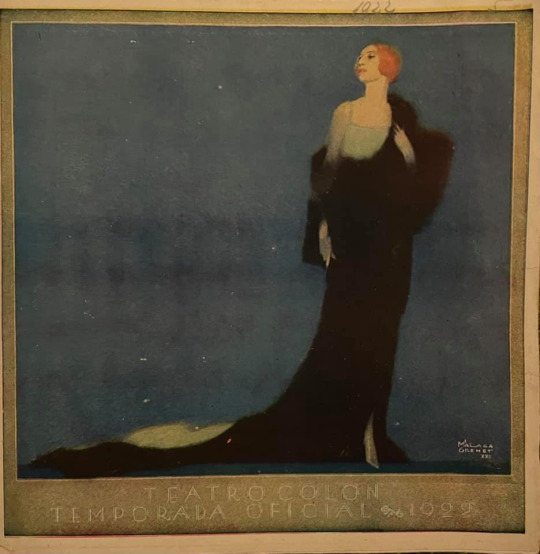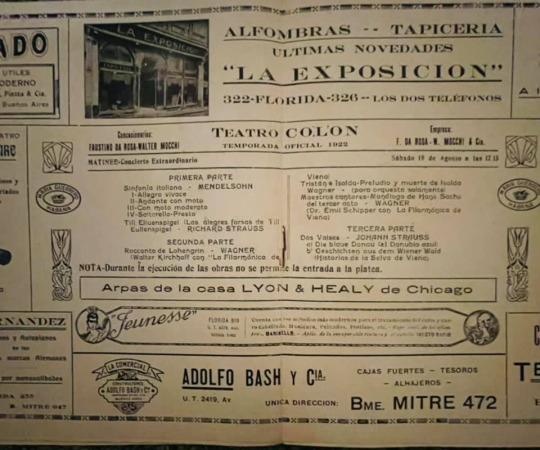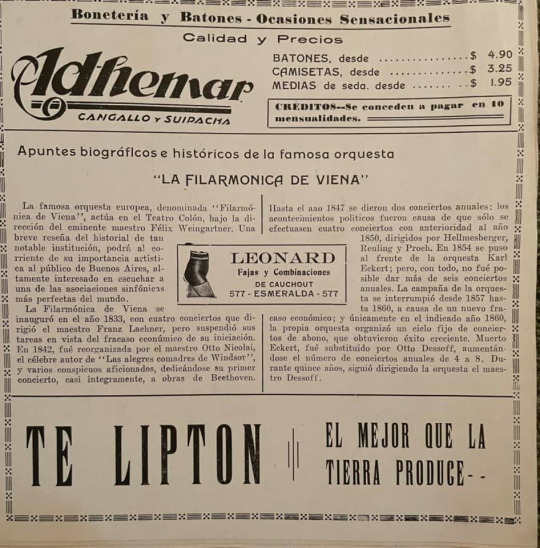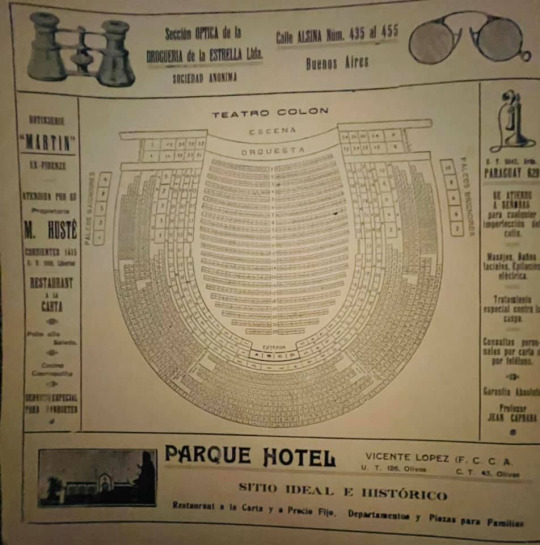#Felix Weingartner
Text
youtube
Felix Weingartner (1863-1942) - Violin Concerto in G Major, Op. 52
I. Allegro placido - Allegro molto 0:00 II. Andantino quasi allegretto 13:40 III. Caprice savoyard: Allegro molto deciso 21:!5
Laurent Albert Breuninger, violin
SWR Rundfunkorkester, Kaiserslauten Alun Francis, conductor
3 notes
·
View notes
Text




In August 1922 the Vienna Philharmonic gave a guest performance at the Teatro Colón, Buenos Aires, under the direction of Felix Weingartner.
This rare original program from August 19, 1922 shows the evening's works.
This guest performance by the Wiener Philharmoniker was the highlight of the concert season.
#classical music#opera#music history#bel canto#composer#classical composer#aria#classical studies#maestro#chest voice#Felix Weingartner#Weingartner#conductor#Vienna Philharmonic#program#concert#music education#history of music#historian of music
9 notes
·
View notes
Audio
Felix Weingartner | Yaylılar için Serenat, Andante sostenuto

144 notes
·
View notes
Video
youtube
#Felix von Weingartner#Frühling#Spring#op. 80#Symphony Orchestra Basel#Marco Letonja#classical#music
1 note
·
View note
Text

Вейнгартнер Феликс | Ариозо https://arioszo.ru/weingartner-felix/
1 note
·
View note
Video
youtube
Beethoven Grosse Fuge Overture Fuga
Beethoven: Grosse Fuge Overture-Fuga Sinfonia Toronto / Nurhan Arman, Conductor Orchestral version by Felix Weingartner Recorded live on April 8, 2016, CBC Glenn Gould Studio, https://youtu.be/ymg5SpDuT18
8 notes
·
View notes
Text
Welche Musik
LePenseur:" ... paßt zum 08.08. – natürlich um 08:08 – am besten? Hmmm ... ... vielleicht Mahlers Achte? Naja, so früh am Morgen (es ist schließlich Sonntag!) ist das doch etwas heftig ... halt, ich hab's! Beethovens 8. Symphonie läßt einen beschwingt in den Tag gehen! Und hier gibt es eine besonders gelungene (und tontechnisch doch schon brauchbare) Aufnahme der Wiener Philharmoniker unter Felix von Weingartner aus dem Jahre 1936. Weingartner ist schließlich unstrittig einer der Beethoven-Experten aller Zeiten:
1936 sah Weingartner natürlich längst nicht mehr so »jugendlicher Held und Liebhaber« aus wie auf dem Photo, das dieses Video ziert, sondern war längst der Grand Old Man des Dirigentenpultes! Über Weingartner, genauer: den Komponisten Weingartner, heute leider weitgehend in Vergessenheit geraten, obwohl wenigstens die meisten seiner Symphonien eine Wiederentdeckung verdienten, wurde auf diesem Blog bereits ein umfänglicher Artikel veröffentlicht, aus welchem ich eine hübsche, dem Wikipedia-Artikel entnommene Anekdote zitieren möchte:
Ein Wiener Kapellmeister hat den in der Zwischenkriegszeit sehr berühmten Felix Weingartner gefragt, wie schnell man die 5. Sinfonie von Beethoven spielen müsse. Felix Weingartner hat die Frage so beantwortet: „Herr Kollege, nächsten Sonntag spiele ich dieses Werk. Kommen Sie in den Musikverein, dort hören Sie das richtige Tempo.“Touché! Und die obige Aufnahme in ihrer schwungvollen Frische, die trotz ihrer vergleichsweise kurzen Dauer (23:35 min. – ich kenne Interpretationen mit 28-29 min. Länge!) nie gehetzt wirkt, beweist: er hatte völlig recht! http://dlvr.it/S5FGqq "
0 notes
Photo

GB EMI RLS717 フェリックス・ワインガルトナー ベートーヴェン ブラームス ヨハン・シュトラウス2世 ヘンデル リスト ワーグナー リスト THE ART OF FELIX WEINGARTNER https://ift.tt/2RUWYj5
0 notes
Text
youtube
Felix Weingartner (1863-1942) - String Quartet No. 4 in D Major, Op. 62: II. Elegie: Andante un poco moto ·
Sarastro String Quartet
6 notes
·
View notes
Text

Felix Weingartner (1863-1942) was a conductor, composer, pianist and writer. He studied with Franz Liszt and was director of the Vienna Court Opera from 1908-1910, director of the Vienna Philharmonic Concerts until 1927 and director of the Vienna Volksoper from 1919-1924. From 1927-1934 chief conductor and director of the conservatory in Basel. 1935-1936 director of the Vienna State Opera. The photo was taken around 1895.
#Felix Weingartner#Weingartner#classical music#music history#composer#classical composer#classical studies#maestro#conductor#pianist#classical pianist#piano#classical musician#classical musicians#classical history#classical voice#musician#musicians#music education#music theory#history of music#historian of music#aria#diva#prima donna#chest voice#opera#bel canto
4 notes
·
View notes
Text
Grandi direttori del passato - Max Fiedler
Grandi direttori del passato – Max Fiedler

Max Fiedler. Foto ©archive.boston.com
Il nome di Max Fiedler è ben conosciuto dai collezionisti di registrazioni storiche. Lui e Felix Weingartner sono infatti gli unici direttori di cui possediamo incisioni discografiche fra quelli che conobbero personalmente Johannes Brahms (more…)
View On WordPress
0 notes
Video
youtube
Felix Weingartner | Serenade for Strings, Andante sostenuto
13 notes
·
View notes
Text
396: Orin O'Brien on Leonard Bernstein, Fred Zimmerman, and life in the New York Philharmonic
It is an honor and a pleasure to welcome Orin O'Brien to the show! I've been hoping to have Orin as a guest for years, and I want to give a big shout-out to Chris Mathers for connecting the two of us!
We chat about numerous shared acquaintances, including Greg Sarchet, Miloslov Gajdos, David Grossman, Ira Gold, Ed Barker, Hal Robinson, Max Dimoff, Michael Hovnanian, Douglas Mapp, and Ron Wasserman.
More About Orin
New York Philharmonic bassist Orin O’Brien was born in Hollywood to parents in the film industry, George O’Brien and Marguerite Churchill, and received her early musical training in Los Angeles, where she studied with Milton Kestenbaum and Herman Reinshagen. She then studied in New York with Frederick Zimmermann and graduated from The Juilliard School, and is an alumna of the Music Academy of the West, now a partner in the New York Philharmonic Global Academy.
She has been a member of the New York Philharmonic since 1966, where she has played with the world’s leading conductors. She has participated in numerous chamber music festivals, including Marlboro, and in first performances of the Gunther Schuller Quartet for Four Double Basses.
She co-chaired the double bass department of The Juilliard School for ten years, and currently serves on the faculties of the Manhattan School of Music and Mannes College of Music. Her most recent chamber music performances were the quintets of Schubert and Dvorak with the Guarneri String Quartet.
We dig into a wealth of topics, including:
how Orin came to study with Fred Zimmerman
how to play specific excerpts
the switch from gut strings to steel strings and the premiere of the Gunther Schuller Quartet (these two events are interlocking)
how Orin felt about being the first woman in the NY Phil (the answer will surprise you!)
how to really be a good principal player
what trips people up in auditions
New York in the 50s
Herman Reinshagen and the bass lineage of the 20th century
the great premieres throughout her career
how special Riccardo Muti is as a conductor, and what makes him special - one of the living greats
what was special about the musicianship of Carlos Kleiber
how a great conductor can use imagery to inspire the orchestra
Links to Check Out:
Double Bass Notebook - amazing book by Orin O'Brien
Orin's New York Philharmonic page
the Manhattan School of Music double bass program
Orin O'Brien Tribute from ISB 2013 (arranged and conducted by Inez Wyrick and narrated by Kristin Korb)
Felix Weingartner - On the performance of Beethoven’s Symphonies (PDF)
Women in Orchestras panel discussion with Orin - Brooklyn Museum
the Miloslav Gajdos video Orin references
Corresponding with Carlos: A Biography of Carlos Kleiber
Contrabass Conversations is sponsored by:
The Upton Bass String Instrument Company. Upton's Mittenwald model is a sister to their popular Brescian model. The contrabasses from the Mittenwald school are characterized by a high-shouldered gamba pattern with outside linings on deep ribs, resulting in a fine orchestral double bass. Our version incorporates all the ergonomic improvements and geometries found in other Upton models, with great flexibility in sizing afforded by the stout German pattern. The gamba pattern, especially when combined with a flat back, allows us to build this instrument in the 5/8ths sizing of the Kloz copy, all the way up to a large 7/8ths pattern built to lift a string section or push a big band.
Bass Violin Shop - Offers the Southeast's largest inventory of laminate, hybrid and carved double basses. Whether you are in search of the best entry-level laminate, or a fine pedigree instrument, there is always a unique selection ready for you to try. Trade-ins and consignments welcome!
Subscribe to the podcast to get these interviews delivered to you automatically!
Check out this episode!
1 note
·
View note
Text
Firsts and Lasts

John Flanagan, Flynn Center
A preview of Vermont Symphony Orchestra’s Masterworks concert happening Saturday, March 16 on the Flynn Center MainStage. Tickets and information are available at www.flynncenter.org.
In a letter from Richard Strauss to Professor Hugo Burghauser, Strauss’s Duet Concertino’s dedicatee, the composer wrote that his concertino depicted the scene of a dancing princess who becomes “alarmed by the grotesque cavorting of a bear in imitation of her.” Smooth as the bear must be, the princess is soon wooed and dances with him, a gesture upon which the bear becomes a prince.
While Strauss hears beauties and beasts in his concertino, a listener at the end of a robust Vermont winter could be forgiven for discerning the sensations of spring awakening: snow in retreat; budding branches; woodpiles diminishing; dirt roads churned to mud—in effect, change in the sequence; vernal firsts, brumal lasts.
Firsts and lasts pop up frequently throughout the Vermont Symphony Orchestra’s upcoming Masterworks performance at the Flynn. For firsts, look to the last piece on the program, Georges Bizet’s Symphony in C Major, the composer’s first—and effectively only—symphony. Bizet wrote it shortly after his 17th birthday, taking compositional cues from another first symphony, that of his instructor, the great Charles Gounod, who had drafted his, in D, the year prior. Popular as Bizet’s symphony is now, the composer, known (unfortunately) for Carmen and little else, probably never heard it performed.
Penned around 1856, it wasn’t until 1935 that Austrian conductor Felix Weingartner debuted Bizet’s symphony, in Basel, Switzerland. The delay stems from neglect; for if Bizet himself seemed to take no great care during his lifetime to enshrine his symphony into posterity, his survivors certainly didn’t either. His wife, Genevieve, entrusted a heap of her late husband’s work to the composer Reynaldo Hahn (a paramour of Proust), who in turn gave a cursory glance at the material and deemed little of it worthy. The perhaps embittered, lesser composer handed Bizet’s works off to the Conservatoire de Paris, where Weingartner, at the request of Bizet biographer Douglas Parker, later rescued the “student” symphony. With stunningly sweet moments in the second movement and a brisk buzz in the fourth, the Symphony in C is an exemplifying artifact vindicating Bizet as far more than a one-opera wonder.
Another key first of Saturday evening belongs to the VSO’s extraordinary guest, New York Philharmonic principal clarinetist Anthony McGill, the NY Phil’s first African American principal player in history. In 2009, McGill joined Yo-Yo Ma, Itzhak Perlman, and Gabriela Montero to perform at President Obama’s inauguration. Speaking recently to the Rutland Herald, McGill mused that the Mozart Clarinet Concerto he’ll lead the orchestra in is “the standard by which we judge everything on our instrument…just sincerity of expression, and beauty of the singing phrase and line throughout.”
Like Strauss’s concertino, the Clarinet Concerto, written in 1791, was Mozart’s last instrumental work. Characteristic of Mozart’s later, flowing style, the opening allegro movement establishes an air of accumulating revelry, providing the ideal contrast for the second, adagio movement, where the orchestra draws out a clear horizon for the clarinet’s exploratory and lulling leads.
Strauss incorporated a similar fragility into the concertino, with the clarinet circling the bassoon—helmed on Saturday by VSO’s principal bassoonist, Janet Polk—like acquaintances reacquainting. Their spin churns to a gusting, explicit theme announced by the strings, perhaps marking where Strauss’s beast becomes a prince, or, for me, where winter melts to spring.
This week, there’s rain in the forecast and partly sunny skies. There are highs in the 50s and lows and the teens. There’s been more birdsong in the morning when I take my dog out to pee, and despite the snow still covering the ski slopes, there have been cars at the nursery on the way into town. The days of change are here, and just in case the summer lies within them, take a cue from Strauss: dance with the bear.
0 notes
Video
youtube
Beethoven: Grosse Fuge Overture-Fuga
Sinfonia Toronto / Nurhan Arman, Conductor
Orchestral version by Felix Weingartner
https://youtu.be/ymg5SpDuT18
Recorded live on April 8, 2016, CBC Glenn Gould Studio, Toronto
4 notes
·
View notes
Text
May 07 in Music History
1667 Death of German composer Johann Jacob Froberger in Hericourt.
1704 Birth of German composer Carl Heinrich Graun in Saxony.
1744 Birth of composer Joseph Beer in Bohemia.
1746 Birth of German violinist and composer Karl Stamitz in Mannheim.
1747 J.S. Bach meets with King Frederick II of Prussia in Potsdam.
1769 Birth of composer Giuseppe Farinelli.
1793 Death of Italian composer Pietro Nardini in Florence.
1800 Death of Italian composer Nicoló Piccini in Passy, suburban Paris.
1818 Death of Bohemian composer Leopold Kozeluch in Vienna.
1824 FP of Beethoven's Choral Symphony No 9, at the Kärntnertor Theater in Vienna. Beethoven kept time but the musicians followed the assistant conductor, Michael Umlauf.
1825 Death of Italian composer Antonio Salieri in Vienna, at age 74.
1829 Death of Italian composer Mauro Giuliani.
1833 Birth of German composer Johannes Brahms in Hamburg.
1836 Death of German composer Norbert Burgmüller in Aachen.
1840 Birth of Russian composer Pyotr Tchaikovsky.
1850 Birth of Hungarian conductor Anton Seidl in Budapest.
1861 Birth of Hindu poet and composer Rabindranath Tagore.
1873 Birth of American composer Clarence Dickenson.
1883 Opening of The Royal College of Music in London.
1883 Birth of composer Gino Roncaglia.
1888 FP of Lalo's opera Le Roi d'Ys in Paris.
1890 FP of Godard's "Dante et Béatrice" Paris.
1901 Birth of Belgian composer Marcel Poot in Vilvorde.
1907 Birth of composer Jef van Durme.
1908 Birth of Dutch composer Wouter Paap in Utrecht.
1910 Birth of German composer Heinrich Konietzny in Gliawitz.
1910 Birth of pianist Edward Kilenyi.
1913 Birth of clarinetist David Glazer.
1915 Sinking of the Lusitania taking the life of Irish composer O'Brien Butler Whitehall.
1918 Birth of composer Argeliers Leon.
1919 Birth of English violinist Emanuel Hurwitz.
1926 FP of Darius Milhaud's opera Les malheurs d'Orphée at the Théatre de la Monnaie in Brussels.
1927 Birth of Swedish soprano Elisabeth Soderstrom in Stockholm.
1931 Birth of Swedish baritone Ingvar Wixell in Lulea.
1931 Birth of Swedish tenor Helge Brilioth in Vaxjo.
1936 Birth of English composer Cornelius Cardew in Winchcombe.
1942 Death of Austrian conductor Felix Weingartner in Winterthur, Switzerland.
1944 FP of revised version of Aaron Copland's Our Town film score suite. Boston Pops conducted by Leonard Bernstein.
1945 Birth of composer Ann Gebuhr.
1945 FP of Fran Martin´s In Terra Pax, an oratorio, on radio broadcast celebrating the end of WWII, in Geneva.
1947 FP of Virgil Thomson's opera The Mother of Us All in NYC.
1949 FP of Hans Werner Henze's opera Das Wundertheater in Heidelberg, Germany
1950 Birth of English composer Philip Lane.
1954 Birth of American composer Frank Halferty.
1958 American pianist Van Cliburn signs contract with RCA Victor records.
1961 Birth of American conductor Robert Spano.
1963 Birth of American composer Mike Christianson.
1964 Birth of Scottish composer Kevin Mayo in Stirling.
1970 Death of English composer John Raynor in Sussex.
1981 Death of American composer Peggy Stuart Cooledge in Cushing, ME.
1985 FP of David Ward-Steinman's Chroma Concerto for multiple keyboards, percussion, and chamber orchestra. Noveau West Chamber Orchestra conducted by Terry Williams, with the composer and Amy-Smith-Davie, soloists, in Scottsdale, AZ.
1988 FP of Karheinz Stockhausen's opera Montag von Licht 'Monday from Light' at the Teatro alla Scala in Milan.
1988 FP of Michael Torke's ballet Black and White. NY City Ballet Orchestra, David Alan Miller conducting, at the New York State Theater.
1993 FP of Harrison Birtwistle's Five Distances for Five Instruments at the Purcell Room, by the Ensemble InterContemporain, in London.
1998 FP of Joan Tower's Tambor. Pittsburgh Symphony, Mariss Jansons conducting.
1999 FP of Robert X. Rodriguez' Bachanale concertino for Orchestra. San Antonio Symphony, Christopher Wilkins conducting.
2002 Death of Catalan composer Xavier Montsalvatge.
2002 Death of British contralto Monica Sinclair in London.
2005 FP of Richard Danielpour and Nobel Prize-winning novelist Toni Morrison's Margaret Garner at Detroit Opera House
38 notes
·
View notes